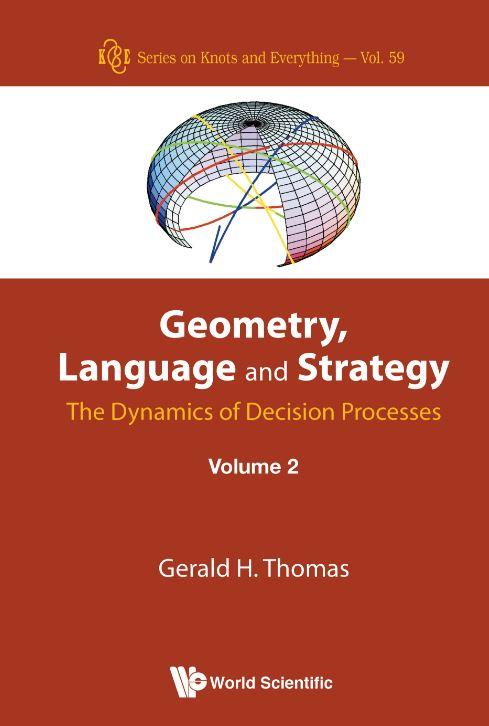
Credit: World Scientific
Decisions are not random. They are a connected network rippling from the past into the future. Is it not commonly accepted that human decision making is the result of free will and is therefore not deterministic? Yet there is an opposing view based on the theory of games that some aspects are deterministic. When this view is extended to include the system dynamics of space and time, an engineering approach to decision-based social structures becomes possible, with potentially profound consequences.
The author's approach to decision processes in this book is distinct from the normal one using Bayesian probability. Geometry, Language and Strategy: The Dynamics of Decision Processes (Volume 2) provides a unified deterministic extension using game theory as the foundation for spatial geometry. Time is incorporated into this foundation in a way consistent with ideas from system dynamics, a well-known approach used to model social and business phenomena. At the mathematical level, the theoretical structure is that used in electrical engineering, electromagnetic theory and gravitational theories, and so has been well-studied. At the application level, the structure reduces to game theory for static behaviors at the equilibrium point, but covers a significantly larger range. The foundation takes local behaviors and merges them into a unified and global theory.
Though the unification of behaviors is technical, the value is the ability to extrapolate local behaviors from a single point in space and time to behaviors for entire social structures and their evolution in time. A consequence, for example, is that competitive behavior, which forms the kernel of game theory, must be joined with distinct codes of conduct: both are needed to understand stable social structures.
The book gives a systematic and self-contained exposition of the foundation and indicates the various consequences with numerical examples. The exposition follows a path similar to engineering disciplines, with many of the same prerequisites. The ideas were first presented in Vol. 1 with examples of harmonic behaviors.
This volume extends the examples to forced harmonic and transient behaviors. It explores in much more depth the role spatial connectivity plays in decision making. One example is how related stocks perform in the market. The volume provides background information for the student that wishes to learn the discipline and apply it to their own problems. In that sense it can be viewed as a textbook on the subject.
###
This book retails for US$222 / £184 at major bookstores. To know more about the book or to purchase the book, visit http://www.worldscientific.com/worldscibooks/10.1142/9782.
About the Author
Gerald H. Thomas has 10 years of experience in high energy particle physics at CERN, Switzerland, University of Helsinki, Finland and Argonne National Laboratory, USA; and 11 years of experience in Engineering at the Milwaukee School of Engineering, USA. He has also gained 25 years of experience in the corporate world at AT&T Bell Labs (now Nokia Bell Labs), USA, Motorola (Cellular Division), USA, and a successful start-up company in Florida, USA; in project management, software engineering, and senior and executive management. Dr Thomas has worked closely with System Dynamics consultants trained at MIT to help control the delivery and staffing over-runs for a large software project. It was this project that generated the idea that a deterministic theory of decisions could apply not only to software projects, but more generally to any field of human endeavor in which decisions play a significant role. The key was to tie this idea to a theoretical foundation, which his experience in particle physics provided.
About World Scientific Publishing Co.
World Scientific Publishing is a leading independent publisher of books and journals for the scholarly, research, professional and educational communities. The company publishes about 600 books annually and about 130 journals in various fields. World Scientific collaborates with prestigious organizations like the Nobel Foundation, US National Academies Press, as well as its subsidiary, the Imperial College Press, amongst others, to bring high quality academic and professional content to researchers and academics worldwide. To find out more about World Scientific, please visit http://www.worldscientific.com.
For more information, contact Amanda Yun at [email protected]
Media Contact
Amanda Yun
[email protected]
@worldscientific
http://www.worldscientific.com
############
Story Source: Materials provided by Scienmag





